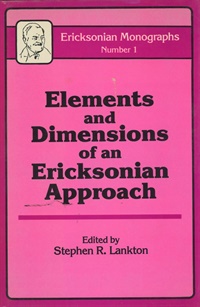Ericksonian Monographs 01 - Elements and Dimensions of an Ericksonian Approach (Hardcover)
- Average Rating:
- Not yet rated
- Topic Areas:
- Not Available
- Author:
- Stephen Lankton, MSW
- Copyright:
-
1985
- Number of Pages:
- 151
- License:
- Never Expires.
Tags: Ericksonian Monographs
Description
Description:
Book is used, but in good condition.
This is the inaugural issue of a continuing new series of Ericksonian Monographs sponsored by the Milton H. Erickson Foundation as part of its ever-expanding educational forum for mental health professionals.
The Ericksonian Monographs will provide an opportunity for the exchange of ideas, knowledge, and clinical experience relating to Ericksonian Hypnosis and to individual and family therapy, with or without hypnosis, utilizing the principles and techniques developed by Milton H. Erickson.
Ericksonian Monograph No. 1 makes available a richly stimulating collection of papers on both clinical and theoretical themes, including previously unpublished work by Erickson. All of the articles here are original and the noted authors come from many perspectives and approaches to treatment - medicine, psychology, social work, family therapy, hypnotherapy, psychiatry. All are in the forefront of what may be the most rapidly growing influence in the field of therapy.
The articles in this inaugural issue are themselves an indication of the far-ranging influence of Erickson's work in many areas. There is documentation for medical applications by William Bank who has provided prints of X-rays showing the control of bleeding using Ericksonian suggestions. Carol Lankton has presented a thoughtful examination of the principles of Erickson's approach. One of Erickson's previously unpublished educational and training examples on Memory and Hallucination is elucidated by Ernest Rossi. A theoretical model of states of consciousness in individual and family therapy is contributed by Monograph editor, Stephen Lankton, and will help link hypnotherapy and family therapy. Jeffery Zeig presents several anecdotes relating personal views of the impact that Erickson made on students, trainees, and clients. William Matthews examines Erickson's work from a cybernetic model that illustrates many tactics that distinguish Erickson's work and explain the role therapists play in affecting the reality they perceive with their clients. Michael Yapko presents an overview of hypnotic and nonhypnotic interventions aimed at helping depressed individuals. An application of Erickson's perspective, adapted to a unique diagnostic aid, is presented by Corydon Harnmond. Also, Milton Erickson himself is represented by a previously unpublished article on certain principles of medical hypnosis, contributed by Mrs. Elizabeth Erickson.
When the aim of the Ericksonian Monographs is to expand and promote the work and influence created by Milton H. Erickson, it must be remembered that Erickson himself disapproved of schools of therapy, believing that any school focuses on its own delimiting approaches as the "right" way and excludes others as the "wrong" way to do therapy. He felt that the individuality of the patient and of the therapist is foremost and emphasized that psychotherapy should be formulated to meet the uniqueness of the individual's needs.
It is this spirit of intellectual freedom that inspires the Ericksonian Monographs as a vehicle that will contribute to the comprehension and practice of effective therapy by therapists of many different theoretical schools, Ultimately, it's the patient who will benefit.
Credits
Author

Stephen Lankton, MSW Related Seminars and Products
Stephen R. Lankton, MSW, is a Licensed Clinical Social Worker (LCSW) in Phoenix, Arizona. In addition to his extensive training in Gestalt Therapy, and Transactional Analysis, he studied regularly with Milton H. Erickson, M. D. from July 1975 through December 1979. He is the Editor-in-Chief of the American Journal of Clinical Hypnosis (since 2005) and a Life-Fellow of the American Society of Clinical Hypnosis (ASCH). He has maintained a private psychotherapy practice and trained therapists worldwide for five decades.
He is a Diplomate in Clinical Hypnosis, an Emeritus Clinical Member of the International Transactional Analysis Association (ITAA), and Past-President of the American Hypnosis Board for Clinical Social Work. He is on the teaching faculty of the Milton H. Erickson Foundation.
Steve has received two Lifetime Achievement Awards: the “Lifetime Achievement Award for Outstanding Contribution to the Field of Psychotherapy” from the Milton H. Erickson Foundation, and the “Lifetime Achievement Award for Contributions to The Field of Hypnosis” from the American Society of Clinical Hypnosis.
He served as Faculty Associate at Arizona State University (ASU) 2004-2008 and the ASU Graduate School of Social Work 2011- 2018 and was appointed by the Governor to the Arizona Board of Behavior Health Examiners where he served from 2009-2016 and was the Board Chairperson from 2014 to 2016.
He authored, co-authored, or edited 20 books on psychotherapy and hypnosis with translations in seven languages and over 68 chapters and peer reviewed articles including The Answer Within, and Tools of Intention and the recent “Chapter 8: States of Consciousness Model and Ericksonian Approaches to Hypnosis” in the Routledge International Handbook of Clinical Hypnosis.


